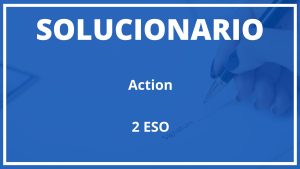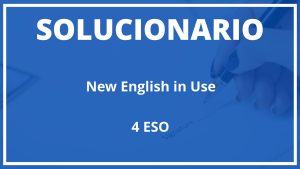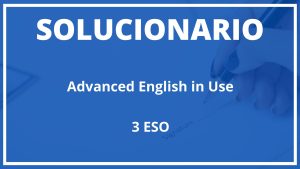
Indice de contenidos del Solucionario del Libro Ingles New Action Burlington Books 2 ESO
Para realizar una consulta rápida del contenido del solucionario, puedes usar el índice de materias y de temas que se encuentra a continuación.
Materias:
- 1. Present simple and present continuous
- 2. Past simple
- 3. Present perfect
- 4. Going to
- 5. Can and can’t
- 6. Modal verbs
- 7. First conditional
- 8. Second conditional
- 9. Adverbs
- 10. Relative clauses
- 11. Gerunds and infinitives
- 12. Present perfect continuous
- 13. Past simple and past continuous
- 14. Past perfect
- 15. Third conditional
- 16. Countable and uncountable nouns
- 17. Some, any, a lot of, few, little
- 18. Prepositions of time and place
- 19. There is / there are
- 20. Present simple questions
- 21. Present continuous questions
- 22. Questions with be
- 23. Yes / No questions
- 24. Question words
- 25. Articles
- 26. Possessive adjectives and pronouns
- 27. Reflexive pronouns
- 28. Indefinite pronouns
- 29. Demonstrative pronouns and adjectives
- 30. Possessive ‘s
- 31. Present simple and present continuous for future
- 32. Present perfect for future
- 33. Going to for future
- 34. Will for future
- 35. Future continuous
- 36. Future perfect
- 37. Future perfect continuous
- 38. Present simple passive
- 39. Present continuous passive
- 40. Past simple passive
- 41. Present perfect passive
- 42. Verb + object + to-infinitive
- 43. Verb + object + gerund
- 44. Verb + object(s) + adjective
- 45. Verb + object(s) + past participle
- 46. Verb + object + that-clause
- 47. Verb + object + wh-clause
- 48. Verb + object + whether-/if-clause
- 49. It + be + adjective(s) / noun(s) + to-infinitive
- 50. It + be + adjective(s) / noun(s) + gerund
- 51. There + be + noun(s) / pronoun(s) + to-infinitive
- 52. There + be + noun(s) / pronoun(s) + gerund
- 53. It + be + adjective(s) / noun(s) + that-clause
- 54. It + be + adjective(s) / noun(s) / pronoun(s) + wh-clause
- 55. It + be + adjective(s) / noun(s) / pronoun(s) + whether-/if-clause
- 56. Verb + infinitive without to
- 57. Verb + -ing
- 58. Verb + object + infinitive without to
- 59. Verb + object + -ing
- 60. Verb + -ing or to-infinitive
Temas:
- 1.1 Present simple affirmative
- 1.2 Present simple negative
- 1.3 Present simple questions
- 1.4 Short answers
- 1.5 Present simple and adverbs of frequency
- 1.6 Present simple and time expressions
- 1.7 Present continuous affirmative
- 1.8 Present continuous negative
- 1.9 Present continuous questions
- 1.10 Short answers
- 1.11 Present continuous and time expressions
- 1.12 Present simple or present continuous?
- 2.1 Past simple affirmative
- 2.2 Past simple negative
- 2.3 Past simple questions
- 2.4 Short answers
- 2.5 Past simple and time expressions
- 2.6 Irregular verbs
- 3.1 Present perfect affirmative
- 3.2 Present perfect negative
- 3.3 Present perfect questions
- 3.4 Short answers
- 3.5 Present perfect and time expressions
- 3.6 For and since
- 4.1 Going to affirmative
- 4.2 Going to negative
- 4.3 Going to questions
- 4.4 Short answers
- 5.1 Can affirmative
- 5.2 Can negative
- 5.3 Can questions
- 5.4 Short answers
- 6.1 Modal verbs: ability
- 6.2 Modal verbs: permissions and prohibitions
- 6.3 Modal verbs: requests and offers
- 7.1 First conditional affirmative
- 7.2 First conditional negative
- 7.3 First conditional questions
- 7.4 Short answers
- 8.1 Second conditional affirmative
- 8.2 Second conditional negative
- 8.3 Second conditional questions
- 8.4 Short answers
- 9.1 Adverbs of manner
- 9.2 Adverbs of degree
- 9.3 Adverbs of frequency
- 9.4 Adverb position
- 10.1 Relative clauses: defining
- 10.2 Relative clauses: non-defining
- 10.3 Relative pronouns: who, which, whose, where, when, that
- 11.1 Gerunds after certain verbs
- 11.2 Gerunds after prepositions
- 11.3 Infinitives after certain verbs
- 11.4 Infinitives after certain adjectives
- 12.1 Present perfect continuous affirmative
- 12.2 Present perfect continuous negative
- 12.3 Present perfect continuous questions
- 12.4 Short answers
- 12.5 Present perfect continuous and time expressions
- 13.1 Past simple and past continuous: action in progress
- 13.2 Past simple and past continuous: action at a certain time in the past
- 13.3 Past simple and past continuous: interrupted action in the past
- 13.4 Past simple questions
- 13.5 Past continuous questions
- 13.6 Short answers
- 14.1 Past perfect affirmative
- 14.2 Past perfect negative
- 14.3 Past perfect questions
- 14.4 Short answers
- 15.1 Third conditional affirmative
- 15.2 Third conditional negative
- 15.3 Third conditional questions
- 15.4 Short answers
- 16.1 Countable and uncountable nouns
- 16.2 Uncountable nouns: a little / a few
- 16.3 A lot of, plenty of, lots of
- 16.4 Countable and uncountable nouns: some, any, no
- 17.1 Some, any, a lot of, lots of: affirmative
- 17.2 Some, any, a lot of, lots of: negative
- 17.3 Some, any, a lot of, lots of: questions
- 17.4 Some, any, a lot of, lots of: short answers
- 18.1 Prepositions of time: in, on, at
- 18.2 Prepositions of time: in the morning, in the afternoon, in the evening
- 18.3 Prepositions of time: on Monday, on Tuesdays, on holidays
- 18.4 Prepositions of time: at half past nine, at a quarter to four
- 18.5 Prepositions of time: at the weekend, at night
- 18.6 Prepositions of time: at Christmas, at Easter
- 18.7 Prepositions of time: in January, in 2010
- 18.8 Prepositions of time: in the morning, in the afternoon, in the evening
- 18.9 Prepositions of time: on Monday, on Tuesdays, on holidays
- 18.10 Prepositions of time: at half past nine, at a quarter to four
- 18.11 Prepositions of time: at the weekend, at night
- 18.12 Prepositions of time: at Christmas, at Easter
- 18.13 Prepositions of time: in January, in 2010
- 18.14 Prepositions of place: in, on, at
- 18.15 Prepositions of place: in the street, in the city, in England
- 18.16 Prepositions of place: on the left, on the right, on the corner
- 18.17 Prepositions of place: at the bus stop, at the cinema, at school
- 19.1 There is / there are: affirmative
- 19.2 There is / there are: negative
- 19.3 There is / there are: questions
- 19.4 There is / there are: short answers
- 20.1 Present simple questions: affirmative
- 20.2 Present simple questions: negative
- 20.3 Present simple questions: questions
- 20.4 Present simple questions: short answers
- 21.1 Present continuous questions: affirmative
- 21.2 Present continuous questions: negative
- 21.3 Present continuous questions: questions
- 21.4 Present continuous questions: short answers
- 22.1 Questions with be: affirmative
- 22.2 Questions with be: negative
- 22.3 Questions with be: questions
- 22.4 Questions with be: short answers
- 23.1 Yes / No questions: affirmative
- 23.2 Yes / No questions: negative
- 23.3 Yes / No questions: questions
- 23.4 Yes / No questions: short answers
- 24.1 Question words: what, where, when, who, why, how
- 24.2 Question words: what, where, when, who, why, how: questions
- 24.3 Question words: what, where, when, who, why, how: short answers
- 25.1 A / an
- 25.2 A / an: questions
- 25.3 A / an: short answers
- 25.4 The
- 25.5 The: questions
- 25.6 The: short answers
- 25.7 No article
- 25.8 No article: questions
- 25.9 No article: short answers
- 26.1 Possessive adjectives and pronouns
- 26.2 Possessive adjectives and pronouns: questions
- 26.3 Possessive adjectives and pronouns: short answers
- 27.1 Reflexive pronouns
- 27.2 Reflexive pronouns: questions
- 27.3 Reflexive pronouns: short answers
- 28.1 Indefinite pronouns: somebody, anybody, nobody, everyone, somebody, anything, nothing, everything
- 28.2 Indefinite pronouns: somebody, anybody, nobody, everyone, somebody, anything, nothing, everything: questions
- 28.3 Indefinite pronouns: somebody, anybody, nobody, everyone, somebody, anything, nothing, everything: short answers
- 29.1 Demonstrative pronouns and adjectives: this, that, these, those
- 29.2 Demonstrative pronouns and adjectives: this, that, these, those: questions
- 29.3 Demonstrative pronouns and adjectives: this, that, these, those: short answers
- 30
Soluciones del Libro Ingles New Action Burlington Books 2 ESO Photocopiable PDF
¿Qué es y cómo se usa el Solucionario del Libro Ingles New Action Burlington Books 2 ESO Photocopiable PDF El solucionario del libro de inglés New Action Burlington Books 2 ESO es una herramienta muy útil para ayudar a los estudiantes a aprender y mejorar su inglés. Se trata de una serie de ejercicios y actividades que están diseñadas para reforzar los conceptos que se tratan en el libro de texto. Los estudiantes pueden usar el solucionario para revisar y practicar lo que han aprendido, y también para obtener ayuda cuando se enfrentan a dificultades.





